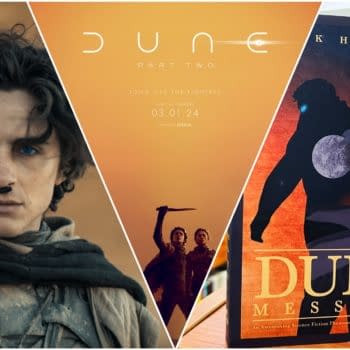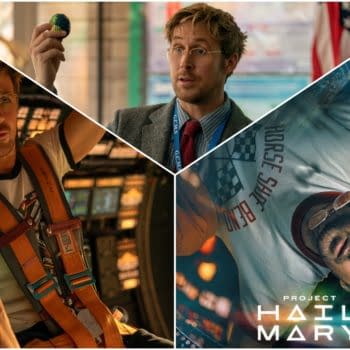Posted in: Movies, Recent Updates | Tagged: entertainment, film, indy filmmaking, music, Post Production, Robin Hood Films, sound
Film Schooling – Insider Insights On Indy Filmmaking: Post Production, Music, And Sound
By Chris Hood
(This is Part Twenty Twenty of an ongoing series to help educate aspiring filmmakers on the process of making their first film. Previous articles in this series can be found at BleedingCool.com and MovieIndustry.com)
Parts: 1, 2, 3, 4, 5, 6, 7, 8, 9, 10, 11, 12, 13, 14, 15, 16, 17, 18, 19, 20, 21
Yes, I was originally going to title this article "Sound and Music" but beat you to the punch. I robbed you of a lame pun. So eat it, we're moving on.
As we get into the realm of finalizing audio on your picture, I'd like to preface this section with the fact that your final sound mix will likely be a decisive factor in letting a distributor or buyer gauge how much money you spent on your film. In addition, how much your project feels like a "real" movie will come in large part from how professional and complete your sound mix turns out to be. I have turned off films after less than five minutes simply because the sound was not to the minimal professional level. I'll tolerate bad acting and lame dialogue longer than a shoddy sound mix. The fact is, in some cases I can sell a film with bad acting and lame dialogue if it has other marketable elements (i.e. boobies) but I can't sell a film with bad sound.
At some point in the post process, the producer has to decide how much time and money he wants to put into audio. This comes down to the money paid to the sound mixer and how much to allocate to looping. "Looping" (also called ADR for "automatic dialogue replacement) is the process of bringing actors into the studio to have them lip synch their lines to replace the original, dirty audio from the location shoot with a cleaner, clearer version created in the studio. Every film needs some looping. As a producer you should have been expecting it and you should have budgeted for it. You should have written something into the actor contracts to allow for this. You should have known it was inevitable. And now you do.
Unfortunately, most low budget films have low budget sound. Most films submitted to me to consider handling for distribution are small budget, under $500k and usually under $250k (though we would never admit this to buyers…more on that in a future article). And the sound sucks on the majority of these. There are may levels of suckness ranging from "unacceptable" to "get your head out of your ass". Let's start with the most obvious.
The most egregious issues come from sound that's unintelligible or simply missing. Far too often, I see scenes where I can't hear some, occasionally much, of what actors are saying. Yes, this actually happens a lot. And I can even tell you "how" it happens some of the time. The director and/or editor are so familiar with the script and dialogue, that they know it by heart…often literally. They "hear" the lines because they know what's coming. This mistake is particularly easy to make if it's just a word or sentence here or there that's unintelligible to the average viewer, but it does happen on a larger scale as well. Sometimes these issues can be fixed. Good sound mixers have the tools and the skills to do some amazing things with original sound, but there are limits. Often, the original sounds simply has to be scrapped and you realize looping really is unavoidable.
It's around this time when you're figuring out how to get your actors back in to the studio and deciding which lines aren't so terrible that you can live with them, that you'll be wishing you spent the extra money in production to get the more experienced location sound mixer. It happened on my first film. It happens on almost every first film. You're crunching numbers and have to decide if you want the $1200 a week sound mixer or the $1500 a week sound mixer. It's only when you get to post that you realize you made the wrong decision trying to do it on the cheap. That thousand dollars you saved during the shoot is going to cost you several thousand dollars in post…which you may very well not have. Your sound mixer, cinematographer and first A.D. are your three most important crew members. Remember that (And, yes, I realize director didn't make it in the top three).
So every line needs to be clear and understandable…just like in a "real" movie. And every sound needs to be there. As obvious as this seems, it's another very common problem and it stems from two things.
First, there are sounds that simply aren't recorded during production. Either they didn't exist or they did and were never sweetened or added. There are any number of situations when sounds didn't exist during the shoot. Maybe an actor throws something off screen while someone catches it with the intention of adding the hit or break later in post. Often times, a director will shout "thunder" or "gunshot" to signify something for the actors to react to. Guess what? You not only have to remove the director's cue, but you also have to add the that sound later! And sometimes, the directional microphone simply doesn't pick up the sound or pick it up clearly enough. If the noise isn't "on point" (i.e. the subject of the shot and/or mic) it's likely in need of work or simply isn't usable at all. All these things need to be fixed.
Second, when you loop a scene, you generally lose all the other sound information. When you erase the original location sound to put in the new, cleaner dialogue, you lose all the other sound effects. This is often a bigger problem than you would think because it's more than recreating the sound of a glass being set down or a door closing. A scene has a whole amalgam of sounds and that glass or door are only the most obvious. There is ambient sound that needs to be there and it needs to be consistent. It may be an almost imperceptible noise from traffic on a highway a quarter mile away, electrical systems in the building, the nearly imperceptible sound of someone sitting on a leather sofa, background crowd noise, whatever the "sound" of that location is if everyone stops talking and just focuses on the generally ignored symphony of that setting. When you strip that all away to loop, it all has to be added back in again.
Music, in most cases, is another key component in a film. How and where to use music is a very subjective choice. There are times it can make or break a scene. Although I'm generally a fan of using music liberally, there are wonderful examples of films that have taken a minimalistic approach to music and been better for it. One of the best examples I can think of is The Mist. Horror films generally rely on music to help create an ominous mood, but The Mist uses almost no music…and it works perfectly in that movie.
The one piece of advice I can offer on music is that hiring a composer is far more work, and usually more money, than buying cues from a catalog or library. Lately, I've found I enjoy the latter and it saves money. The idea of hiring a composer is exciting and glamorous since that's what they do on "big" films, but is that necessary for your film? Almost certainly not.
The biggest downside to hiring a composer is the time. This is one of those things that always takes considerably longer than you would expect. And that's before you take into account the changes you'll likely request. Unless you're willing to accept whatever the composer gives you, it's hard to go back to a guy who has scored a scene and say, "You know, it's not really working for me. Try something else." The composer naturally doesn't like to hear that, either. Scoring can take months and months of waiting on your guy to get all the pieces you want and I've seen it take a year or more. This is another one of those places where you can pick two: good, fast and cheap.
The other alternative is to buy from a library. And personally, I love this approach. It's cost effective and there is some amazing stuff out there. You can generally scout the catalogs and get a feel for what they have, even confirming they have pieces you want before committing. And many of these companies will be very accommodating to your budget. Some will let you pick and choose from their entire library for a grand or two for the film, whether that's 10 or 20 or 50 pieces. You can grab the pieces, plug them in to the scene and see how it feels. You can do this a dozen times or more until you find a good fit. Your composer isn't going to keep giving you new pieces because you don't care for the first or fifth or tenth attempt for that scene and it would quickly become unreasonable to ask. I don't think I'd consider a composer on future projects unless it was a seven figure budget and even in some of those cases, I would still go with a library.
So once you have all the dialogue crisp and clean, all the sound effects and ambients are in place, and you have your music placed, it's time for the final step – leveling. Every piece needs to be in its proper place…and they need to be consistent from scene to scene. This is sometimes even a problem in big films. We've all sat in front of the TV and had to ride the remote control from scene to scene because the mix wasn't consistent. This shouldn't happen. If you're reviewing your mix and ever have to adjust the volume up or down, something is wrong. There's no excuse for it ("We ran out of money" is never an acceptable excuse). There can be scenes where the dialogue is clean, but the music is too loud so the viewer can't quite make it all out. The music might be too soft in a scene and therefore lose it's effectiveness. Just make sure all the pieces "fit".
Finishing the sound on your film can be terribly frustrating because you feel so close. It's usually the last thing you have to do to really call the film "done," and at that point you really, really want to be done! But get it right. Take the extra week or month or three months if you have to. Because the next step is actually showing the film to distributors and sales agents and they're only going to watch it once (if you're even that lucky). They are not going to come back and request you finish the audio and submit it again. So before next week, when I start giving you all the tricks to start trying to sell your film, I want to make sure you have done everything properly to give yourself the best possible chance.
Because once the film is truly, completely and finally done…is when the hardest part actually starts.
Chris Hood is a writer, producer and director of such films as "Counterpunch" starring Danny Trejo (a Lionsgate release) and "Dirty Dealing 3D" with Michael Madsen and C. Thomas Howell. He and Jon Schultz own Robin Hood Films, a Las Vegas-based distribution company representing English language films around the world and operates a film blog at MovieIndustry.com. He's also dead sexy. (Mr. Hood denies any involvement in the creation of this mini-bio.)

















